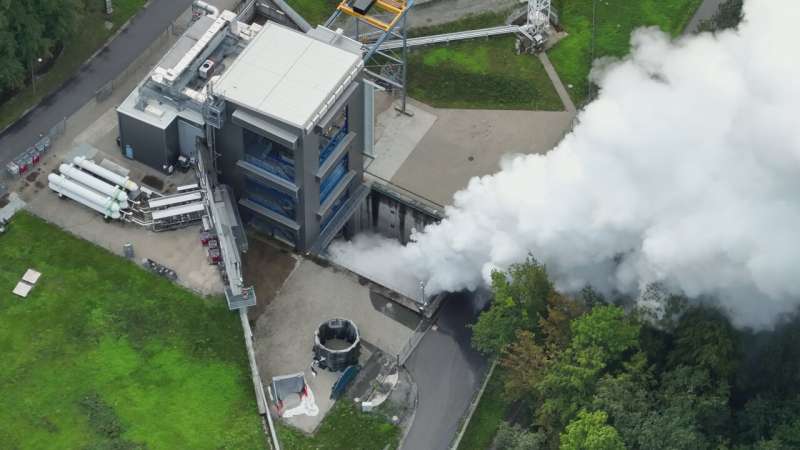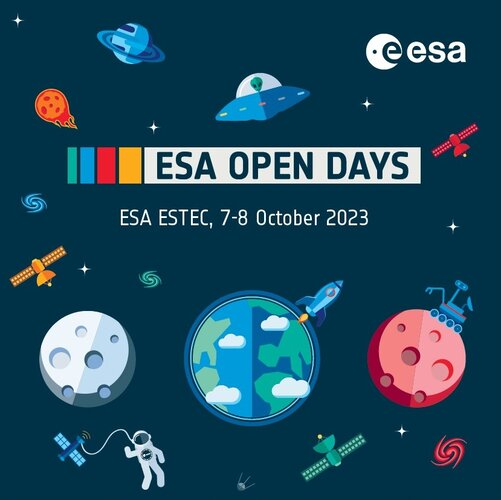
Copernical Team
SpaceX launches new batch of Space Defense Agency missile tracking satellites
 SpaceX on Saturday successfully launched a Falcon 9 rocket carrying the Space Development Agency's newest batch of tiny missile defense satellites from Vandenberg Space Force Base in California.
The launch vehicle lifted off at 10:26 a.m. from Vandenberg's Space Launch Complex 4E before separating from the rest of the launch platform and landing back at Vandenberg about 7.5 minutes afte
SpaceX on Saturday successfully launched a Falcon 9 rocket carrying the Space Development Agency's newest batch of tiny missile defense satellites from Vandenberg Space Force Base in California.
The launch vehicle lifted off at 10:26 a.m. from Vandenberg's Space Launch Complex 4E before separating from the rest of the launch platform and landing back at Vandenberg about 7.5 minutes afte SatixFy announces strategic $60M transaction with MDA
 SatixFy Communications Ltd. (NYSE AMERICAN: SATX) reports a $60 million transaction with MDA Ltd. (TSX: MDA), a leading provider of advanced technology and services to the rapidly expanding global space industry. The strategic transaction establishes cooperation between the companies, to utilize SatixFy's revolutionary digital payload chip based technology to advanced digital satellite payloads,
SatixFy Communications Ltd. (NYSE AMERICAN: SATX) reports a $60 million transaction with MDA Ltd. (TSX: MDA), a leading provider of advanced technology and services to the rapidly expanding global space industry. The strategic transaction establishes cooperation between the companies, to utilize SatixFy's revolutionary digital payload chip based technology to advanced digital satellite payloads, ReOrbit completes oversubscribed seed funding round
 ReOrbit, a Helsinki-based leading provider of software-enabled satellites, has completed an oversubscribed Seed funding round for US $7.4M, led by Inventure VC, along with participation from 10x Founders, existing investor Icebreaker.vc, Expansion, and Yes VC.
ReOrbit enables real-time dataflow in space and provides Earth Observation and SatCom operators with flight software, satellite pla
ReOrbit, a Helsinki-based leading provider of software-enabled satellites, has completed an oversubscribed Seed funding round for US $7.4M, led by Inventure VC, along with participation from 10x Founders, existing investor Icebreaker.vc, Expansion, and Yes VC.
ReOrbit enables real-time dataflow in space and provides Earth Observation and SatCom operators with flight software, satellite pla China solicits names for manned lunar exploration vehicles
 The China Manned Space Agency (CMSA) on Thursday began to solicit names for the new vehicles of future manned lunar exploration missions. The public is invited to suggest names for the new generation of manned spacecraft and the manned lunar lander, said the CMSA.
According to an earlier report, China plans to land its taikonauts on the moon before 2030 to carry out scientific exploration.
The China Manned Space Agency (CMSA) on Thursday began to solicit names for the new vehicles of future manned lunar exploration missions. The public is invited to suggest names for the new generation of manned spacecraft and the manned lunar lander, said the CMSA.
According to an earlier report, China plans to land its taikonauts on the moon before 2030 to carry out scientific exploration. Intuitive Machines announces $20M equity investment
 Intuitive Machines, Inc. (Nasdaq: LUNR) has entered into a definitive securities purchase agreement with a certain institutional investor for the issuance and sale of stock and warrants in exchange for a $20 million equity investment. The agreement is expected to close on September 5, 2023, subject to customary closing conditions.
Intuitive Machines intends to use the net proceeds for gene
Intuitive Machines, Inc. (Nasdaq: LUNR) has entered into a definitive securities purchase agreement with a certain institutional investor for the issuance and sale of stock and warrants in exchange for a $20 million equity investment. The agreement is expected to close on September 5, 2023, subject to customary closing conditions.
Intuitive Machines intends to use the net proceeds for gene A bigger, better space-ripple detector
 The search for space-shaking ripples in the universe just got a big boost. An MIT-led effort to build a bigger, better gravitational-wave detector will receive $9 million dollars over the next three years from the National Science Foundation. The funding infusion will support the design phase for Cosmic Explorer - a next-generation gravitational-wave observatory that is expected to pick up rippl
The search for space-shaking ripples in the universe just got a big boost. An MIT-led effort to build a bigger, better gravitational-wave detector will receive $9 million dollars over the next three years from the National Science Foundation. The funding infusion will support the design phase for Cosmic Explorer - a next-generation gravitational-wave observatory that is expected to pick up rippl Satellites detect where locust infestations begin
 Locusts can destroy grain crops and pastures, threatening people's livelihoods. In an international project, researchers from the German Aerospace Center have now developed methods to help detect locust outbreaks as early as possible and take action against them. Earth observation images acquired by satellites play a central role in this. These images enable the early detection of environmental
Locusts can destroy grain crops and pastures, threatening people's livelihoods. In an international project, researchers from the German Aerospace Center have now developed methods to help detect locust outbreaks as early as possible and take action against them. Earth observation images acquired by satellites play a central role in this. These images enable the early detection of environmental Trial by fire for the Ariane 6 upper stage

Validation testing continues for ESA's all-new Ariane 6 launch vehicle, with firing of its two upper stage engines to simulate the way they will have to operate together during a flight.
The test of the full upper stage—including the new Vinci engine and a smaller Auxiliary Power Unit (APU)—took place on a purpose-built test bench at German Aerospace Center DLR's engine test center in Lampoldshausen, Germany.
Ariane 6 media briefing – September 2023
 Video:
01:00:57
Video:
01:00:57
Watch the replay of the media briefing and the question-and-answer session outlining the progress achieved and the upcoming steps in the Ariane 6 development test campaign. Updates are given on tests conducted at Europe’s Spaceport in Kourou, French Guiana, and at the German Aerospace Center DLR’s technical centre in Lampoldshausen, Germany.
The briefing was held on 4 September 2023 from ESA’s Headquarters in Paris, France. Participants included:
Josef Aschbacher, Director General, ESA
Martin Sion, CEO, ArianeGroup
Philippe Baptiste, Chairman and CEO, CNES
Stéphane Israël, CEO, Arianespace
Toni Tolker-Nielsen, Director of Space Transportation, ESA
Carine Leveau, Director of Space Transportation, CNES
Stefan Schlechtriem, Director of Lampoldshausen,
ESA Open Day at ESTEC 2023: Registration now open

Take your chance to meet astronauts, view spacecraft and peer behind the scenes of Europe’s space adventure at our ESA Open Day at ESTEC in the Netherlands on Sunday 8 October. Registration is now open.
































